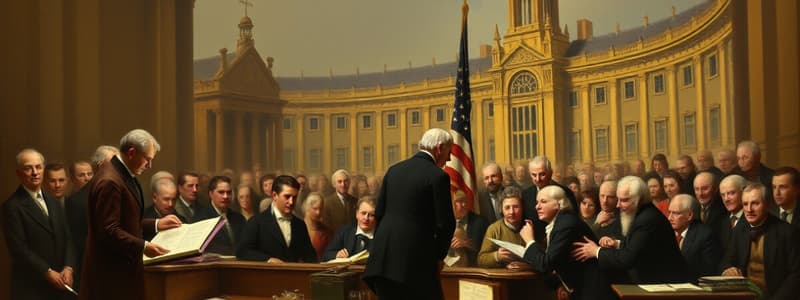Podcast
Questions and Answers
David Lloyd George introduced the Old Age Pensions Act in 1908, which provided up to 5 shillings a week to individuals over seventy.
David Lloyd George introduced the Old Age Pensions Act in 1908, which provided up to 5 shillings a week to individuals over seventy.
True (A)
The People's Budget proposed by Lloyd George aimed to increase taxation primarily for those earning below £3,000 a year.
The People's Budget proposed by Lloyd George aimed to increase taxation primarily for those earning below £3,000 a year.
False (B)
The 1911 Parliament Act allowed the House of Lords to prevent the passage of money bills.
The 1911 Parliament Act allowed the House of Lords to prevent the passage of money bills.
False (B)
Henry Asquith was the Prime Minister who appealed to King George V for support to pass the 1911 Parliament Act.
Henry Asquith was the Prime Minister who appealed to King George V for support to pass the 1911 Parliament Act.
The maximum length of time between general elections was extended from five years to seven years by the 1911 Parliament Act.
The maximum length of time between general elections was extended from five years to seven years by the 1911 Parliament Act.
The introduction of a supertax of 6d in the pound was primarily aimed at individuals earning £5000 a year.
The introduction of a supertax of 6d in the pound was primarily aimed at individuals earning £5000 a year.
The Conservative majority in the House of Lords supported the redistribution of wealth proposed in the People's Budget.
The Conservative majority in the House of Lords supported the redistribution of wealth proposed in the People's Budget.
The 1911 Parliament Act provided payment for Members of Parliament for the first time.
The 1911 Parliament Act provided payment for Members of Parliament for the first time.
Flashcards are hidden until you start studying
Study Notes
Introduction of Social Reforms
- In 1908, David Lloyd George introduced the Old Age Pensions Act, providing financial assistance to individuals over seventy.
- Pensions ranged from 1s. to 5s. per week, necessitating an increase in government revenue by £16 million annually.
The People's Budget (1909)
- In 1909, Lloyd George announced the People's Budget to fund social reforms through new taxation measures.
- Tax rates included 9d. in the pound for lower incomes and 1s. 2d. for incomes over £3,000 annually.
- A supertax of 6d. per pound was levied on individuals earning £5,000 a year.
- Increased death duties and heavy taxes on property transactions targeted wealth redistribution.
Opposition from the House of Lords
- The Conservative majority in the House of Lords opposed the People's Budget, aiming to block wealth redistribution efforts.
- Lloyd George countered opposition by campaigning in working-class areas, framing the nobility as barriers to social welfare.
The Parliament Act (1911)
- Aimed at diminishing the House of Lords' power, the 1911 Parliament Act was enacted to prevent the blocking of "money bills."
- Limited the Lords' ability to delay legislation to three sessions of Parliament, enhancing the legislative power of the Commons.
- Reduced the maximum interval between general elections from seven years to five years.
- Introduced MP salary payments, facilitating broader political participation.
Role of the Monarchy
- When the House of Lords sought to impede the Parliament Act, Prime Minister Asquith appealed to King George V for intervention.
- The king agreed to create 250 new Liberal peers if necessary to ensure a Liberal majority in the Lords.
- This pressure forced the Conservatives to concede, allowing the 1911 Parliament Act to become law.
Studying That Suits You
Use AI to generate personalized quizzes and flashcards to suit your learning preferences.



